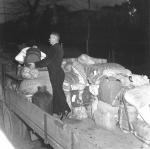
The ‘Jewish Councils’ of Western Europe
Jewish Councils, and similar representative institutions the Nazis forced upon the Jewish communities in occupied Europe, have been the subject of much controversy in the public and the academic domains.
The tendency to address Jewish wartime leadership from a moral framework, which started during the war and has continued to the present day, has caused these Jewish bodies have chiefly been remembered as forms of collaboration. Moreover, they have been assessed as part of debates about the mortality rates of the Jews in individual countries. Yet their histories were far more complex than has hitherto been recognised.
Based on a wide range of primary and secondary sources, this is the first comprehensive comparative project of these Jewish bodies of Western Europe during Nazi occupation. It challenges the existing historiography by offering new evidence about the complexity of these organisations and their contexts.

